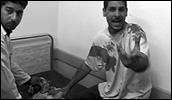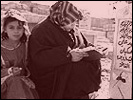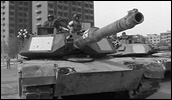Little Birds
- Year
- 2004
- Original title
- Ritoru Bazu Iraku Senka no Kazoku-tachi
- Japanese title
- リトル バーズ イラク 戦火の家族たち
- Director
- Cast
- Running time
- 103 minutes
- Published
- 22 January 2006



by Jasper Sharp
The US-led invasion and military occupation of Iraq is sure to be remembered as one of the most controversial and emotive episodes in modern history, forever changing the way the rest of world looks at America. Now almost three years after the toppling of Saddam Hussein's regime, more US soldiers have died in this war on the abstract noun that is "terror" than those in the original 9/11 incident that inspired it, and with subsequent terrorist acts in Madrid and London, one would be hard pushed to claim that the world is a safer place than it was before.
Individual opinions were split between the pro-war and anti-war camps long before the ongoing clamour of pundits and politicians polarized us all into more extreme positions. The righteous tirade of Michael Moore's Fahrenheit 9/11, the top-grossing documentary of all time, hailed at Cannes but snubbed by the Academy, buried whatever legitimate points it had within a volley of non-sequiturs, cheap shots, and sentimental appeals to blue-collar nationalism in a manner that was sure to win over few new converts. On the other hand, writers such as Christopher Hitchens have made considerable capital by siding with the steadfast camp of Bush supporters with books and magazine articles unequivocally justifying the non-UN-sanctioned invasion that resulted in over 100,000 Iraqi dead.
One can't help but feel that the endless rhetoric of voices left and right as they continue to preach to the converted has created a media smokescreen that has all but swamped out the real issue. How often do we hear from those that really matter in all of this: the surviving Iraqi citizens whose lives have been permanently changed through this foreign intervention?
We've all been told how Saddam tortured and murdered his citizens, and how he was stockpiling nuclear and biological weapons to lay waste to the West, but honestly, as "these people" are still fussed and worried over by politicians and press alike, how much do most of us comfortably sitting in our living rooms really know about the lives of the average Iraqi, either before or after the war? Who knows, for example, how large the average Iraqi family is, what they eat for breakfast, or how they relax in the evening? How many people out there in TV land could hum the Iraqi national anthem? Does anyone outside of the country have any idea how the war was reported in the various Iraqi media? What do the citizens of Baghdad really understand by the word "democracy" and why do they themselves believe they became the target of US military aggression?
It remains one frustrating truism that while we now have the technology to capture up-to-date images of any war, no matter where it occurs, the manner in which moving images are disseminated across the world, be it through cinema distribution or the more strictly controlled channels of TV, is heavily weighted to exclude foreign-produced material (i.e. that which is not produced either domestically or in America.)
All of this means that Little Birds, an independently-produced Japanese addition to the debate that has already won the Human Rights award at the 2005 Locarno International Film Festival, is in serious danger of passing most of us by unnoticed. Yet, viewing the harrowing events portrayed in the film invokes such a torrent of thoughts and emotions it is difficult to put them all down in words. This is a film that simply cries out to be seen more widely.
In 1998, producer Takaharu Yasuoka was instrumental in making sure that A, the epic documentary about life in the Aum cult after the Tokyo subway gas attacks (followed several years later by A2), reached Japanese cinema screens after the revelatory behind-the-scenes footage captured by director Tatsuya Mori was rejected by Fuji Television. For Little Birds he has similarly placed himself behind Takeharu Watai, a freelance video journalist who previously provided the international media with coverage of recent troubled world hotspots including Afghanistan and Sudan. Watai remained in Iraq during the conflict and for many months after the occupation, capturing on video the kind of day-to-day footage that the sound bite-dominated mainstream Western media have by and large kept us shielded from.
Though, from a technical perspective, Little Birds is a vast improvement on the Aum films, which suffered somewhat from an abundance of unnecessary footage and some almost unwatchable handheld camerawork, it follows a fairly similar template. (By a strange cosmic coincidence, both the Aum attacks on Tokyo and the commencement of US hostilities with Iraq for the second Gulf War occurred on the same date, March 20th.) Assuming that the facts and justifications behind the invasion have now been so well rehearsed elsewhere, instead of chronicling events from an outsider's perspective, Little Birds takes its time to listen to those usually ignored in the furore. Its approach is more detached and observational than polemic, reliant upon a chronological accumulation of detail rather than building any strict linear arguments. Rather than resorting to a voiceover strategy, it lets the original footage, shot in areas of Baghdad, Samawa, Falluja, and Abu Ghraib, speak for itself.
It would be naïve to assume that any documentary is completely impartial. The director after all decides where to point the camera and what footage to cut out in the editing room. But for the most part, Watai, who has clearly put himself in some extremely hazardous situations in order to get this film made (at one point he is accused of being a Zionist spy), remains a mere intimation behind the camera, occasionally posing questions in accented English, or becoming more agitated as he catalogues a string of explosions over the Tigris during one of the bombing raids. Only momentarily does he appear onscreen.
In an early sequence shot on March 18th, two days before the war, we see him interviewing the citizens of Baghdad about what they will do on the eve of the attack. One states, as calmly as if he were discussing his Christmas plans, that he will be staying in with his family. Watai's own feelings about the war are made clear when he is confronted by an angry interviewee, demanding why Japan is siding with the US, to which he makes clear that he does not support his government.
While the pretty flashes that lit up the night skies above Baghdad which screened on CNN might have had some of us believe that the month-long conflict was a clean and efficient military success, Watai's camera presents a rather different truth. In the wake of one aerial attack, the camera prowls around a wrecked shopping mall before resting on a child's blood-stained sneaker lying next to a puddle of gore. A hospital lies full of scarred and twisted bodies, amputees and corpses, women and children. An old man angrily indicates to a dead body swarming with flies; "Is he a biological weapon?"
As the US tanks roll into Baghdad, no grateful citizens appear to greet them, just a solitary young woman named Uzma Bashir wielding a large banner saying "How Many Children Have You Killed Today?" This remarkably courageous Human Shield lets out a heartfelt "Fuck you! Cowards!" with a British accent that belies her appearance, as the pimply youths bristling with state-of-the-art weaponry who have come to liberate the city raise their guns at her in warning. The soldiers are clearly uncomfortable in front of the cameras. "We don't kill innocent people," one says, but all evidence presented elsewhere points to the contrary.
Little Birds takes its time introducing the characters around whom its narratives emerge. The most prominent is the 31-year-old Ali Saqban, who lost his children Laith (age 7), Shahad (5), and Zainab (3), when his house was destroyed by three bombs. He is left with just one surviving daughter, Ghufran (7), who remains remarkably bright-eyed and high-spirited given the horrors she has witnessed. The film takes its title from the epitaph on the plank of wood that serves as their makeshift gravestone: "Don't cry dad. We became birds in the sky". As Ali surveys the wreckage of his house, he points out that the bombs fell on a residential area, far from Saddam's palace or militia. Elsewhere a young boy loses his arm after discovering a child's play area full of undetonated cluster bombs in the southern part of the city of Dora.
As the camera presents its images of carnage and destruction in the civilian and commercial areas of downtown Baghdad, one certainly hopes the US has deep pockets. However, three months after the end of the war, we see Ali, unemployed and literally without a home, locked in a bureaucratic nightmare as he tries to file a damage application claim with the occupying forces. After filling in numerous forms and being asked to provide death certificates and proof of nationality for his three dead children, he is told by the US official that there is currently no system for war reparations. "We don't even know if there will be any funds."
As a Japanese citizen, Watai is quick to point to his own government's unprecedented involvement in foreign affairs after Prime Minister Koizumi's decision to send a "peace keeping" force to Iraq, despite the fact that its American-drafted constitution forbids it from sending troops overseas. (Other films to tackle the issue of Japan and the Middle East include Yutaka Tsuchiya's Peep "TV" Show; Masahiro Kobayashi's Bashing; Hitomi Kamanaka's documentary about the rising number of cases of leukaemia in Iraq due to the depleted uranium shells used in the first Gulf War, Hibakusha - At the End of the World (Hibakusha - Sekai no Owari ni); and Japan's Peace Constitution (Eiga Nihonkoku Kenpo) from Tokyo-based American John Junkerman, detailing international reactions to the Japanese government's attempts to jettison the famous "Article 9" no-war clause.)
Watai ironically follows a sequence of US soldiers at ease taking souvenir snapshots with disposable cameras in front of the wrecked house where Saddam Hussein's sons were killed with a press junket staged for the Japanese media featuring Colonel Masahisa Sato, the leader of the Ground Self-Defense Force (GSDF) based in Samawah, posing with their bento boxes full of rations in front of flashing camera bulbs. As Iraq is overrun by foreign interests, it is curious to note that with his military fatigues, beret and moustache, the colonel looks a dead ringer for Hussein... Elsewhere, Japanese involvement is shown in a more positive light, with NGOs providing essential medicine supplies to hospitals.
Curiously, Watai barely touches on life in Baghdad during the rule of the Ba'ath Party. Though the film opens with peaceful scenes of Iraqi life before the invasion, the only real indication of Saddam's presence is his face on the banknotes handed over shop counters as part of everyday transactions. His appearance on a TV in the background of a café after his capture elicits a few sideways glances, but nowhere are any personal opinions on the former ruler given. As Saqban shows us round his own newly refurbished house, constructed with the help of his neighbours, he guides us around a wall of family portraits that includes two brothers and an uncle who died in the Iran-Iraq war of the 1980s. "I've lost 6 of my family because of Saddam," he announces, but less with anger than with regret. Hussein remains a shadowy figure throughout, just as the Aum guru Asahara did in Mori's films: a sensible editorial judgement on behalf of Watai, given how the former ruler's image is already so firmly fixed in the eyes of the world.
It is difficult to lend much credence to the opinions of the occupying forces interviewed at various parts of the film that "these people" are in any way better off than they were before. The US soldiers caught on camera are rather more reluctant to be drawn into the subject of the fabled Weapons of Mass Destruction that were given as the raison d'être for the invasion. But Hadeel Kadem, the energetic 12-year-old girl whose operation to remove a piece of shrapnel from her eye occupies one strand of the film, no doubt speaks for many when she says "I think they want to take our oil".
After the harrowing catalogue of events that lead to the film's conclusion, Ali Saqban desperately looks for reasons behind his own personal tragedy. His daughter Ghufran and his wife are the only things he has left to cling to. As Ghufran skips off to school, returning racked with guilt after mistakenly bringing back the identical UNICEF-issued blue schoolbag of her classmate, there remains the hope that life at last seems to be settling into some form of routine. But this is cruelly snuffed in the closing sequence of a burning tenement block at night and the screams of its residents after a car bomb explodes outside. There will clearly be no easy resolutions to this national tragedy.